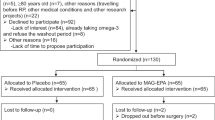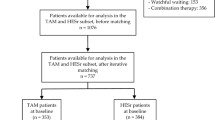Abstract
Background:
The primary objective of this study was to compare the effects of pomegranate juice on PSA doubling times (PSADT) in subjects with rising PSA levels after primary therapy for prostate cancer.
Methods:
Double-blind, placebo-controlled multi-institutional study, evaluated the effects of pomegranate liquid extract on serum PSA levels. The primary end point of this study was change in serum PSADT. Additional secondary and exploratory objectives were to evaluate the safety of pomegranate juice and to determine the interaction of manganese superoxide dismutase (MnSOD) AA genotype and pomegranate treatment on PSADT.
Results:
One-hundred eighty-three eligible subjects were randomly assigned to the active and placebo groups with a ratio of 2:1 (extract N=102; placebo N=64; juice N=17). The majority of adverse events were of moderate or mild grade. Median PSADT increased from 11.1 months at baseline to 15.6 months in the placebo group (P<0.001) compared with an increase from 12.9 months at baseline to 14.5 months in the extract group (P=0.13) and an increase from 12.7 at baseline to 20.3 in the juice group (P=0.004). However, none of these changes were statistically significant between the three groups (P>0.05). Placebo AA patients experienced a 1.8 month change in median PSADT from 10.9 months at baseline to 12.7 months (P=0.22), while extract patients experienced a 12 month change in median PSADT from 13.6 at baseline to 25.6 months (P=0.03).
Conclusions:
Compared with placebo, pomegranate extract did not significantly prolong PSADT in prostate cancer patients with rising PSA after primary therapy. A significant prolongation in PSADT was observed in both the treatment and placebo arms. Men with the MnSOD AA genotype may represent a group that is more sensitive to the antiproliferative effects of pomegranate on PSADT; however, this finding requires prospective hypothesis testing and validation.
This is a preview of subscription content, access via your institution
Access options
Subscribe to this journal
Receive 4 print issues and online access
$259.00 per year
only $64.75 per issue
Buy this article
- Purchase on Springer Link
- Instant access to full article PDF
Prices may be subject to local taxes which are calculated during checkout


Similar content being viewed by others
References
Bishop FL, Rea A, Lewith H, Chan YK, Saville J, Prescott P et al. Complementary medicine use by men with prostate cancer: a systematic review of prevalence studies. Prostate Cancer Prostatic Dis 2011; 14: 1–13.
Aviram M, Dornfeld L, Rosenblat M, Volkova N, Kaplan M, Coleman R et al. Pomegranate juice consumption reduces oxidative stress, atherogenic modifications to LDL, and platelet aggregation: studies in humans and in atherosclerotic apolipoprotein E-deficient mice. Am J Clin Nutr 2000; 71: 1062–1076.
Rettig MB, Heber D, An J, Seeram NP, Rao JY, Liu H et al. Pomegranate extract inhibits androgen-independent prostate cancer growth through a nuclear factor-kappaB-dependent mechanism. Mol Cancer Ther 2008; 7: 2662–2671.
Seeram NP, Aronson WJ, Zhang Y, Henning SM, Moro A, Lee RP et al. Pomegranate ellagitannin-derived metabolites inhibit prostate cancer growth and localize to the mouse prostate gland. J Agric Food Chem 2007; 55: 7732–7737.
Koyama S, Cobb LJ, Mehta HH, Seeram NP, Heber D, Pantuck AJ et al. Pomegranate extract induces apoptosis in human prostate cancer cells by modulation of the IGF-IGFBP axis. Growth Horm IGF Res 2010; 20: 55–62.
Sartippour MR, Seeram NP, Rao JY, Moro A, Harris DM, Henning SM et al. Ellagitannin-rich pomegranate extract inhibits angiogenesis in prostate cancer in vitro and in vivo. Int J Oncol 2008; 32: 475–480.
Rettig MB, Heber D, An J, Seeram NP, Rao JY, Liu H et al. Pomegranate extract inhibits androgen-independent prostate cancer growth through a nuclear factor-kappaB-dependent mechanism. Mol Cancer Ther 2008; 7: 2662–2671.
Adhami VM, Siddiqui IA, Syed DN, Lall RK, Mukhtar H . Oral infusion of pomegranate fruit extract inhibits prostate carcinogenesis in the TRAMP model. Carcinogenesis 2012; 33: 644–651.
Wang L, Alcon A, Yuan H, Ho J, Li QJ, Martins-Green M . Cellular and molecular mechanisms of pomegranate juice-induced anti-metastatic effect on prostate cancer cells. Integr Biol (Camb) 2011; 3: 742–754.
Pantuck AJ, Leppert JT, Zomorodian N, Aronson W, Hong J, Barnard RJ et al. Phase II study of pomegranate juice for men with rising prostate-specific antigen following surgery or radiation for prostate cancer. Clin Cancer Res 2006; 12: 4018–4026.
Paller CJ, Ye X, Wozniak PJ, Gillespie BK, Sieber PR, Greengold RH et al. A randomized phase II study of pomegranate extract for men with rising PSA following initial therapy for localized prostate cancer. Prostate Cancer Prostatic Dis 2012; 16: 50–55.
Smith MR, Manola J, Kaufman DS, George D, Oh WK, Mueller E et al. Rosiglitazone versus placebo for men with prostate carcinoma and a rising serum prostate-specific antigen level after radical prostatectomy and/or radiation therapy. Cancer 2004; 101: 1569–1574.
Li H, Kantoff P, Giovannucci E, Leitzmann MF, Gaziano JM, Stampfer MJ et al. Manganese superoxide dismutase polymorphism, prediagnostic antioxidant status, and risk of clinically significant prostate cancer risk. Cancer Res 2005; 65: 2498–2504.
Jemal A, Siegel R, Xu J, Ward E . Cancer statistics, 2010. CA Cancer J Clin 2010; 60: 277–300.
Sandler HM, Eisenberger MA . Assessing and treating patients with increasing prostate specific antigen following radical prostatectomy. J Urol 2007; 178: S20–S24.
Simmons MN, Stephenson AJ, Klein EA . Natural history of biochemical recurrence after radical prostatectomy: risk assessment for secondary therapy. Eur Urol 2007; 51: 1175–1184.
Wainfan E, Poirier LA . Methyl groups in carcinogenesis: effects on DNA methylation and gene expression. Cancer Res 1992; 52: 2071s–2077s.
Malins DC, Johnson PM, Barker EA, Polissar NL, Wheeler TM, Anderson KM . Cancer-related changes in prostate DNA as men age and early identification of metastasis in primary prostate tumors. Proc Natl Acad Sci USA 2003; 100: 5401–5406.
Gurel B, Lucia MS, Thompson IM, Goodman PJ, Tangen CM, Kristal AR et al. Chronic inflammation in benign prostate tissue is associated with high-grade prostate cancer in the placebo arm of the prostate cancer prevention trial. Can Epi Biom Prevention 2014; 23: 847–856.
De Marzo AM, Platz EA, Sutcliffe S, Xu J, Grönberg H, Drake CG et al. Inflammation in prostate carcinogenesis. Nat Rev Cancer 2007; 7: 256–269.
Trzeciak AR, Nyaga SG, Jaruga P, Lohani A, Dizdaroglu M, Evans MK . Cellular repair of oxidatively induced DNA base lesions is defective in prostate cancer cell lines, PC-3 and DU-145. Carcinogenesis 2004; 25: 1359–1370.
Bravo L . Polyphenols: chemistry, dietary sources, metabolism, and nutritional significance. Nutr Rev 1988; 56: 317–333.
Albrecht M, Jiang W, Kumi-Diaka J, Lansky EP, Gommersall LM, Patel A et al. Pomegranate extracts potently suppress proliferation, xenograft growth, and invasion of human prostate cancer cells. J Med Food 2004; 7: 274–283.
Gasmi J, Sanderson JT . Growth inhibitory, antiandrogenic, and pro-apoptotic effects of punicic acid in lncap human prostate cancer cells. J Agric Food Chem 2010; 58: 12149–12156.
Koyama S, Cobb LJ, Mehta HH, Seeram NP, Heber D, Pantuck AJ et al. Pomegranate extract induces apoptosis in human prostate cancer cells by modulation of the IGF-IGFBP axis. Growth Horm IGF Res 2010; 20: 55–62.
Wang L, Alcon A, Yuan H, Ho J, Li QJ, Martins-Green M . Cellular and molecular mechanisms of pomegranate juice-induced anti-metastatic effect on prostate cancer cells. Integr Biol (Camb) 2011; 3: 742–754.
Domingo-Domenech J, Mellado B, Ferrer B, Truan D, Codony-Servat J, Sauleda S et al. Activation of nuclear factor-kappaB in human prostate carcinogenesis and association to biochemical relapse. Br J Cancer 2005; 93: 1285–1294.
Fradet V, Lessard L, Begin LR, Karakiewicz P, Masson AM, Saad F . Nuclear factor-kappaB nuclear localization is predictive of biochemical recurrence in patients with positive margin prostate cancer. Clin Cancer Res 2004; 10: 8460–8464.
Suh J, Payvandi F, Edelstein LC, Amenta PS, Zong WX, Gelinas C et al. Mechanisms of constitutive NF-kappaB activation in human prostate cancer cells. Prostate 2002; 52: 183–200.
Li N, Oberley RD, Oberley LW, Zhong W . Overexpression of manganese superoxide dismutase in DU145 human prostate cancer cells has multiple effects on cell phenotype. Prostate 1998; 35: 221–233.
Sutton A, Khoury H, Prip-Buus C, Cepanec C, Pessayre D, Degoul F . The Ala16Val genetic dimorphism modulates the import of human manganese superoxide dismutase into rat liver mitochondria. Pharmacogenetics 2003; 13: 145–157.
Hong YC, Lee KH, Yi CH, Ha EH, Christiani DC . Genetic susceptibility of term pregnant women to oxidative damage. Toxicol Let 2002; 129: 255–262.
Mikhak B, Hunter DJ, Spiegelman D, Platz EA, Wu K, Erdman JW Jr et al. Manganese superoxide dismutase (MnSOD) gene polymorphism, interactions with carotenoid levels and prostate cancer risk. Carcinogenesis 2008; 29: 2335–2340.
D'Amico AV, Moul JW, Carroll PR, Sun L, Lubeck D, Chen MH . Surrogate end point for prostate cancer-specific mortality after radical prostatectomy or radiation therapy. J Natl Cancer Inst 2003; 95: 1376–1383.
Freedland SJ, Humphreys EB, Mangold LA, Eisenberger M, Dorey FJ, Walsh PC et al. Risk of prostate cancer–specific mortality following biochemical recurrence after radical prostatectomy. JAMA 2005; 294: 433–439.
Scher HI, Helabi S, Tannock I, Morris M, Sternberg CN, Carducci MA et al. Design and end points of clinical trials for patients with progressive prostate cancer and castrate levels of testosterone: recommendations of the Prostate Cancer Clinical Trials Working Group. J Clin Onc 2008; 26: 1148–1159.
Paller CJ, Olatoye D, Xie S, Zhou X, Denmeade SR, Eisenberger MA et al. The effect of the frequency and duration of PSA measurement on PSA doubling time calculations in men with biochemically recurrent prostate cancer. Prostate Cancer Prostatic Dis 2014; 17: 28–33.
Antonarakis ES, Zahurak ML, Lin J, Keizman D, Carducci MA, Eisenberger MA . Changes in PSA kinetics predict metastasis-free survival in men with PSA-recurrent prostate cancer treated with nonhormonal agents: combined analysis of 4 phase II trials. Cancer 2012; 118: 1533–1542.
Acknowledgements
Study funding, pomegranate products and placebos provided by Pom Wonderful. Manuscript co-author AJP has received research funding from and DH has received research funding and is a paid consultant to Pom Wonderful. Study Principal Investigators include: RD (Taussig Cancer Center Cleveland Clinic), AK (Winthrop Medical Center), AJP (UCLA Institute of Urologic Oncology), JC (Virginia Mason Medical Center), CAP (University of Texas MD Anderson Cancer Center), Sheldon Freedman, Gary Karlin (AdvanceMed Research), WA (UCLA, West LA VAMC), Giribala Patel (St Jude Heritage Medical Group), Andre Liem (Pacific Shores Medical Group), Frederic Kass (Santa Barbara Hematology Oncology Group), Robert Dichman (Central Coast Medical Oncology Corporation), Brad Bauer (Alabama Clinical Research Institute), WC (Alaska Clinical Research Center), GS (Five Valleys Urology), Ron Israeli (Staten Island Urologic Research), Joseph Kuntze (Coastal Medical Research Group), Robert Kratzke (University of Minnesota). Contract Research Organization (CRO) clinical trial support services provided by Radiant Clinical Research, Chicago, IL, USA. Data management and statistical analysis performed by Daniela Markovic and Jeffrey Gornbein, PhD, from the UCLA Department of Biomathematics.
Author information
Authors and Affiliations
Corresponding author
Ethics declarations
Competing interests
Manuscript co-author AJP has received research funding from and DH has received research funding and is a paid consultant to Pom Wonderful. The remaining authors declare no conflict of interest.
Rights and permissions
About this article
Cite this article
Pantuck, A., Pettaway, C., Dreicer, R. et al. A randomized, double-blind, placebo-controlled study of the effects of pomegranate extract on rising PSA levels in men following primary therapy for prostate cancer. Prostate Cancer Prostatic Dis 18, 242–248 (2015). https://doi.org/10.1038/pcan.2015.32
Received:
Revised:
Accepted:
Published:
Issue Date:
DOI: https://doi.org/10.1038/pcan.2015.32
This article is cited by
-
Biochemical recurrence in patients with prostate cancer after primary definitive therapy: treatment based on risk stratification
Prostate Cancer and Prostatic Diseases (2023)
-
Komplementäre oder alternative Medizin in der Onkologie
Die Innere Medizin (2023)
-
Komplementärmedizin in der Uroonkologie
Der Urologe (2021)
-
Zentrale Empfehlungen und Statements der S3-Leitlinie zur komplementären Medizin für Patient*innen mit onkologischen Erkrankungen – Teil 1
Der Onkologe (2021)
-
Komplementäre Medizin in der Uroonkologie
Der Urologe (2020)



